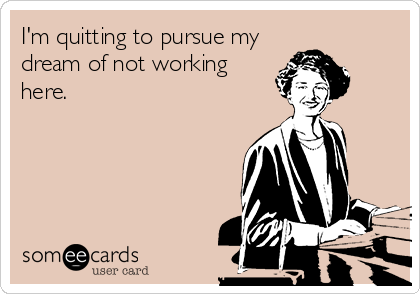Don't Quit Your Day Job
/Don't quit your day job.
I hear that expression every time I sing. It's also the initial advice we give everyone that is looking for a job while working a job that they dislike.
Even if you have enough money to withstand not having a job for many months, don't do it. Don't quit your job so you can spend time looking for another one. Don't fool yourself into thinking that the key to finding another job is simply having more time to conduct your search. Don't listen to your friends and family (or worse, your current co-workers) that tell you quitting is a good idea. No offense, but you shouldn't take career advice from them, especially when you're considering such a drastic move. Did you ever watch American Idol? All of the really terrible singers had one thing in common: they all had friends and family that convinced them they were great. Every one of them. Don't listen to them. Listen to Simon Cowell.
Don't quit your day job.
I realize that sounds like parental advice. It is. My own mother gave me that same advice.
But let me be clear, as a hiring manager, I would almost never recommend quitting a job without another one in place.
There is simply too much risk.
I have done it. Twice, in fact. And I regret it.
The risks far outweigh the potential reward. Clearly, there are times when quitting your job without another one is the only option. Working in a toxic environment that impacts your health can be a reason to do it. Let's face it, that is rare. And if that's the situation you're in, you'll know it. If that's the case, you should at least understand the risks.
Here are the primary risks:
- Getting a job is almost always a competition between you and at least one other candidate. There is far less risk hiring someone that is working than someone that isn't. The prospective employer may not believe your reason why you left.
- Your prospective employer believes you will just quit when the going gets tough. Hiring managers want to hire someone that will stick around when it gets tough. Regardless of the explanation you gave for why you quit your job, it is far too common for the hiring manager to believe that it will translate to you bailing out.
- You are desperate and that will surely impact your interview performance. Even if you've saved enough money to withstand a prolonged unemployed job search you stand a good chance of letting that desperation force you to make bad decisions and interview poorly. Hiring managers expect confidence. It's hard to be confident when desperation could be creeping up. And even if you're not desperate, it is possible that the interviewer will perceive you to be.
- You lose nearly all ability to negotiate. What is your current salary? Zero. It's a great deal harder to position yourself for a higher salary if you have NO SALARY. That goes for everything that is negotiable. And everything can potentially be negotiable.
What do you do instead of quitting? Double down and put more time and effort into your job search. Stop watching TV. Get off Facebook. If you have time after work, don't spend it going out for dinner and drinks. Put that time into your job search, and into doing your current job well.
Oftentimes, you will be remembered mostly for the last couple of months you were at your old job. You have to work harder as you near the end. Let your eventual exit be your motivation.







